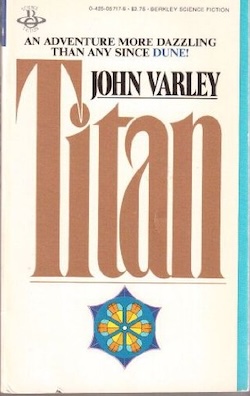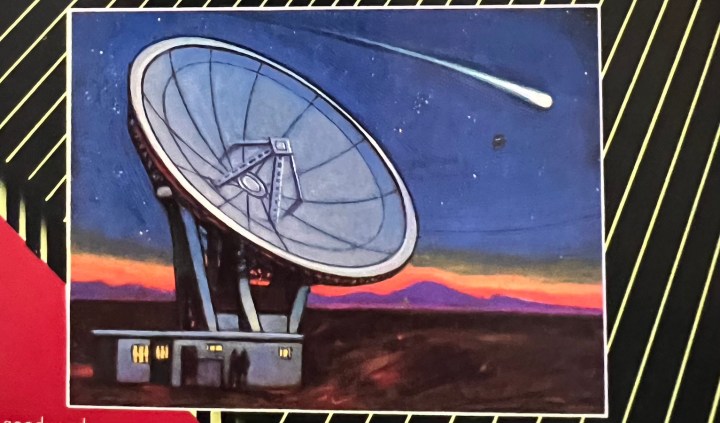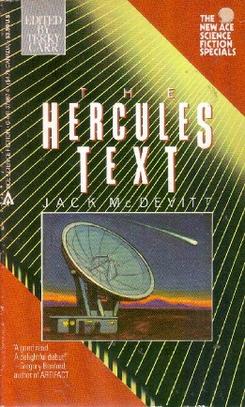‘The Hercules Text’ Struggles To Excite
The Hercules Text (1986) by Jack McDevitt is a first contact novel with a heavy influence of Cold War thinking. McDevitt takes an interesting approach to what first contact and the reasons for it might be like. Despite this, The Hercules Text has difficulty holding the reader’s interest. The Hercules Text may appeal to hard SF fans but lacks emotional punch.
When an X-ray pulsar in the Hercules constellation suddenly stops emitting x-rays the scientists at Goddard Space Center panic. Pulsars don’t just stop emitting for no reason. Then, just as suddenly, the pulsar begins again but with a difference. There is a clear pattern to the emissions that can mean only one thing. A message from space.
Harry Carmichael is an adminstrator at Goddard becomes swept up in the efforts to understand the signal. His role is only to support the scientists and at first it is simply a scientific puzzle. However, when the scientists realise that the signal contains data, advanced data, the puzzle becomes a political game. A game Carmichael must handle so the science can continue.
As the data is decoded it seems like a gift, at first. However, the government sees a different path. A path that could either protect the Earth or destroy it. And Harry Carmichael holds the key to either outcome.
The Hercules Text marries near future SF with Cold War paranoia. However, McDevitt leans a little too heavily into the paranoia. The story begins well with the usual excitement of verified signal from space. However, as the story progresses it becomes difficult to stay engaged.
There is little world building involved in The Hercules Text, however, there is plenty of scientific extrapolation. McDevitt creates science that is extremely plausible and relateable. If you judge The Hercules Text on its imaginative science alone then it rates highly. However, that isn’t possible.
McDevitt also creates very real situations and senarios for his characters. The challenges they face in understanding the signal and what to do with the information is all too real. This is another plus for the novel. However, where McDevitt lets the reader down is in his characters.
Unlike most stories of this type, the main protagonist is not a scientist but an administrator. Harry Carmichael works in HR and payroll. It is unique perspective to involve someone usually not involved in a scientific mystery. Carmichael is thoroughly developed and believable as a character. As are most of McDevitt’s other characters. The simple fact is that none of the characters in The Hercules Text are likeable.
The plain and simple fact is that every single character McDevitt writes is missing a spark to make them leap from the page. Without this spark we are simply reading about facts and events without any immersion. There is a flatness to McDevitt’s characters that keeps them from being sympathetic in any way.
Because the characters are unlikeable there is no dramatic tension. As the plot unfolds and the world becomes increasingly in danger there is nothing to make the reader’s gut clench. There is edge of your seat feelings. The climax, such as it is, passes like a soft breeze without much motion.
Jack McDevitt
I very nearly stopped reading The Hercules Text several times but I continued in hopes of something more. The idea of first contact is one that I usually enjoy but in this case I was put off. Perhaps the biggest reason is the single minded Americanness of the story. McDevitt contrives that only NASA receives the signal and as such America controls it.
This American jingoism is a relic of 1986 and in 2025 it feels backward. Contact by Carl Sagan was published the year before in 1985 and understood that no single country could control a signal of this nature. That control is not even possible.
If you decide to read The Hercules Text read it for its ideas and not its drama. Without drama there is no excitement and no entertainment. The Hercules Text promises much but delivers very little.
#BookReview #JackMcDevitt #SF #TheHerculesText














![[ALT TEXT: THE TIME MACHINE GENE, a Peter August Mystery by Anthony Frangione & New York Times Bestselling Author Maya Kathryn Bohnhoff ]
[ALT IMAGE: On a cover of vivid orange and gold clouds and light, layered on castles and Victorian buildings of deep russet brown, a similarly painted coffin of a pharaoh of all Egypt faces the reader. The eyes are very natural and seem to be contemplating the viewer. In the lower left hand corner next to the words "a Peter August Mystery" is a tiny white silhouette of a Pony Express rider.] [ALT TEXT: THE TIME MACHINE GENE, a Peter August Mystery by Anthony Frangione & New York Times Bestselling Author Maya Kathryn Bohnhoff ]
[ALT IMAGE: On a cover of vivid orange and gold clouds and light, layered on castles and Victorian buildings of deep russet brown, a similarly painted coffin of a pharaoh of all Egypt faces the reader. The eyes are very natural and seem to be contemplating the viewer. In the lower left hand corner next to the words "a Peter August Mystery" is a tiny white silhouette of a Pony Express rider.]](https://bookwyrm-social.sfo3.digitaloceanspaces.com/images/status/58694937-978d-428f-b2bf-35b8ff06e320.jpeg)







